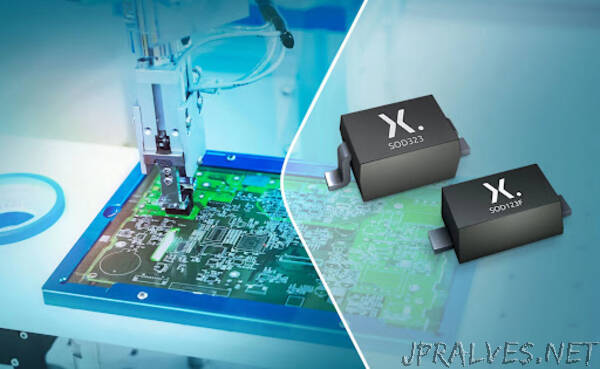
“Nexperia, the expert in essential semiconductors, today announced the industry’s first range of A-selection Zener diodes. With a tolerance of just ±1%, the BZT52H-A (SOD123F) and BZX384-A (SOD323) series provide a higher precision voltage reference compared to the B (±2%) and C (±5%) variants. Matching the rising demands of mobile, portable/wearable, automotive and industrial applications and meeting the increasing regulatory requirements, the two series are also available as Q-portfolio devices.
“Nexperia’s A-selection Zener diode range covers every application from 1.8 V to 75 V while providing a precise voltage reference with the lowest possible tolerance,” says Paula Stümer, product manager at Nexperia. “By replacing B- or C-selection devices with pad compatible A-selection Zener devices, engineers can go to the limits of the MOSFET, if applied to limit voltage for the gate-source path or drain-gate path, or choose from a wider variety of suitable MOSFETs.”
The A-selection Zener diodes have a nominal working voltage range of 1.8 V to 75 V (E24 range). The devices feature a non-repetitive peak reverse power dissipation of ≤40W, total power dissipation ≤250mW and low differential thermal resistance. The low tolerance provides a higher precision voltage, which is especially important for test & measurement applications and enables engineers to replace more costly voltages reference devices. Instead of protecting the MOSFET directly, a more cost-efficient alternative is to connect a Zener diode in parallel to the drain-gate path. Once the Zener breaks through, the MOSFET switches on to stop the drain-source from going into an avalanche breakdown.
The A-selection Zeners is also available as Q-portfolio devices, meeting the AEC-Q101 and ISO/TS16949 automotive quality standards. The focus of these standards is to meet the Stress Test Qualification and quality management system requirements of automotive OEMs. However, customer demands continue to evolve, and more non-automotive applications require additional quality-related services, such as PPAP (Production Part Approval Process) and extended longevity. Another differentiator between the standard and Q-portfolio devices is the Product Change Notifications (PCN) period, which is extended from 90 days, according to JEDEC requirements, to 180 days. In addition, all parts are supported with a minimum longevity of 10 years and come with a shelf-life of more than two years.”
